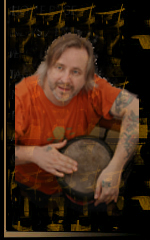
Review of: Taiko to Tabla
Live at the Corn
Exchange, Newbury
Review from: Newbury Weekly
News [May 20 1999]
What do you call someone who hangs around with musicians? A
drummer. This jibe underlines the difference between your average drummer and these
two consummate musicians, who gave an exhilarating evening of virtuosic percussion
playing.
If anyone imagined they would get bored by the sound of just drums for a whole
performance, then Peter Lockett and Joji
Hirota, two percussionists with awesome reputations, dispelled any doubts in the
first number, a gentle piece combining a hand-held Arabic tom-tom and African thumb piano,
to weave a melody which captivated a perhaps initially sceptical audience.
The stage set was a visual fascination of exotic percussion instruments. It was fun trying
to identify their function and possible sound. The instruments were divided into two
collections, with Peter Lockett playing a combination of Japanese and Middle Eastern
instruments, and Joji Hirota, with a complete traditional set of Japanese percussion, as
well as a vast array of African-based instruments. Joji Hirota also plays bamboo flute and
African thumb piano, which added an essential musicality to the inevitable preponderance
of percussion sounds.
The programme varied from gentle, sensitive pieces to thunderous, grand, monumental
crescendos, most of which involved highly arranged orchestration. Very little of the work
was in any sense free form, and much involved complex rhythm patterns which, nonetheless,
one could stay with throughout.
These two musicians played together with perfect synthesis, giving the impression of
musical mind-reading at times. A pleasure for me was the variation from one piece to the
next; we were taken on a journey of discovery of the huge musical possibilities within
drums, gongs and cymbals, whose range was extended by such techniques as bowing on the
cymbal edges, use of the voice and a very clever juxtaposition of material from India,
Japan, the Middle East and Africa. These two are not purists in any sense; they
eclectically mix influences to obtain whatever effect they seek.
The subtlety of tuning of this plethora of instruments underpinned the surprising
musicality of the work. Seeing these two play live was a musical surprise and delight, and
this performance extended my view of the possibilities of pure percussion work. Gavin
Wilkinson

Translations of the Belgium press
reviews - Bruges Festival, 98:
Extracts from: De Standaard
(05-02-98)
"The subtlety of Joji on the shakuhachi, and Peter
Lockett on the timpaan were fascinating until the last minute. The concert started quiet,
until the shakers and cymbals announced a spectacular percussion session. Hirota on congas
and Lockett on tabla.
Even during the most heated moments of the well built up
performance, the two maestros stayed disciplined and controlled. Hirota never gave the
impression that his limit was reached. The interaction between the two musicians was
perfect. Lockett played his Indian 'tals' with a hundred percent of knowledge. Real
climaxes!
The last part of the concert was a strong physical
demonstration: both played on the Japanese Taikos. Sometimes we heard the Kodo sound, but
the way Taiko To Tabla played in pure musical terms, that made the difference.

Extracts from: Het Nieuwsblad
(06-02-98)
"Eleventh Bruges Festival starts in overdrive"
"Taiko To Tabla gave a sublime and memorable
start."
"One is a percussionist from the Japanese tradition,
Joji Hirota, the other is Peter Lockett, who found his musical roots in India. Together
they make the formation Taiko To Tabla. And what they bring is pure beauty."
"...a ballet of fluttering hands on different percussion
instruments..."
"...also visually astonishing..."
"...the standing ovation of the audience was what they
deserved..."

"The opening concert of Taiko to Table was
legendary" - Het Nieuwsblad (10-02-98)
RETURN TO INTERVIEWS /
PRESS MAIN PAGE
Click here to return to
the Taiko to Tabla page
 |

